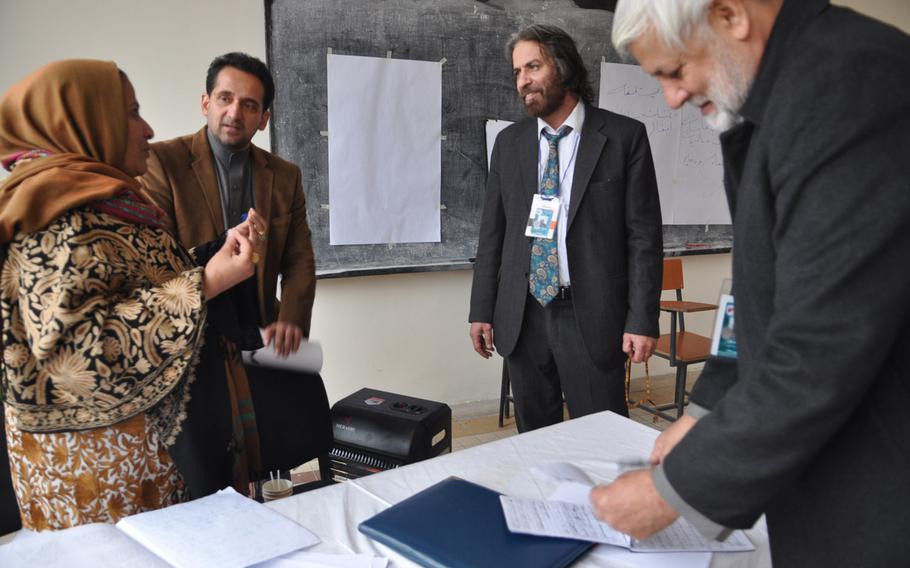Middle East
If Karzai stonewalls on agreement, is US military planning harmed?
Stars and Stripes December 4, 2013

Members of the Afghan Loya Jirga discuss a security agreement that would pave the way for foreign troops to stay in Afghanistan past the end of 2014. The jirga, a gathering of 2,500 community leaders from around the country, was convened by President Hamid Karzai who has said he will respect the council's decision on the security agreement. (Heath Druzin/Stars and Stripes)
WASHINGTON — World leaders have hammered Afghan President Hamid Karzai with threats of the “zero option,” hinted that billions of dollars of international aid are at stake, and even suggested his own ministers could simply sidestep him.
What they want is a signature by the end of 2013 on the bilateral security agreement hammered out between the United States and Afghanistan over the last year, and approved in recent weeks by a grand council of local Afghan leaders and tribal elders.
But the mercurial Karzai now insists he’ll wait until after the April 2014 election of his successor to sign the BSA, which sets the parameters of a post-2014 U.S. mission in Afghanistan and guarantees legal immunity to U.S. troops.
On Tuesday, meeting with NATO allies in Brussels, U.S. Secretary of State John Kerry said someone else in the Afghan government should step in and sign it – perhaps Defense Minister Bismullah Kahn Mohammadi.
“This is not fooling around,” Kerry said.
The U.S. response delivered last week in Kabul by National Security Adviser Susan Rice also minced no words.
“Ambassador Rice reiterated that, without a prompt signature, the U.S. would have no choice but to initiate planning for a post-2014 future in which there would be no U.S. or NATO troop presence in Afghanistan,” according to a White House statement.
Other U.S. officials, including Defense Secretary Chuck Hagel, have likewise stressed that a signature by the end of the year was crucial, saying delay until 2014 would deeply affect the ability to plan a broad range of military operations in Afghanistan.
But would a delay until 2014 really hamper U.S. military planning?
Analysts and military experts were split on the question.
While calling Karzai’s ploy “reprehensible,” Frederick Kagan, a national security analyst at the conservative American Enterprise Institute, said the Obama administration’s year-end deadline was “artificial.”
“There is no planning consequence for the military, whether the BSA is signed now or in May,” he said. “There should not be any meaningful effect on deployments, movements, preparations or training, because all of those things can be turned off if it’s the last minute and the BSA still isn’t signed.
“You would be looking at (a delay lasting into) the second half of next year before you have a situation they’d be seriously worried about.”
There are good reasons to push for a prompt signature, Kagan said, because delay encourages the Taliban and discourages U.S. allies. But laying out the deadline, he said, just gives Karzai – desperate to avoid being seen as the president who OK’d the occupation of the country – another way to thumb his nose at the U.S.
Barry Pavel, vice president and international security analyst at the Atlantic Council, a NATO-focused think tank, said that a publicly announced deadline likely wasn’t helpful. But the Obama administration is right to insist on striking while the iron is hot.
“Some things don’t get better with age, and this is one of them,” he said. “There’s really no magic deadline, it’s just that the more time is taken before that decision, the politically harder it gets to maintain the will of the coalition. It also allows more time for new developments to present new complications, and allows time for mischief by those who don’t want this to go forward.”
The U.S. and its allies – as well as military troops facing the threat of the Taliban – need a signed BSA by year’s end, said retired Gen. David Barno, former top U.S. general in Afghanistan and now a security expert with the Center for a New American Security, a left-leaning think tank.
“Finishing the year with a BSA unsigned would dramatically increase the uncertainty going into NATO’s final year in Afghanistan,” he wrote in an email. “It would certainly encourage the Taliban to wait out the West, anticipating the possibility of a full NATO withdrawal at the end of 2014.”
Although dealing with Karzai can be like overseeing a “really difficult 13-year-old,” said Anthony Cordesman, a defense analyst at the nonpartisan Center for Strategic and International Studies, the Obama administration should at least try to ensure it is signed before the election.
Longer delay could cast the document’s future into doubt.
“As Iraq and others show, it could take four to six months after that to have a working government in place,” he said.
But even with a promptly signed BSA, the U.S. government would lack a clear strategic vision for the future mission in Afghanistan, as indicated by the cavalier discussions of pulling out all troops, Cordesman said.
“When people talk about the zero option, it’s almost being discussed as if some kid doesn’t like the way his friends play baseball and is going to take his ball and go home,” he said. “We don’t seem to have a set of meaningful strategic goals, we don’t have a plan, and we don’t know the cost.”
carroll.chris@stripes.com Twitter: @ChrisCarroll_